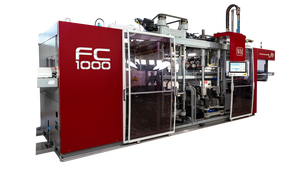August 8, 1998
So, you want to sell your molding business but don't quite know how or to whom. Ronald N. Dubin, chairman of Dubin Clark & Co. Inc., a private investment partnership in Greenwich, CT, recently provided some words of advice to attendees at the SPI Western Section Conference in Coronado, CA.
Dubin says most owners of family businesses find the majority of their net worth is tied up in the business, and their net assets aren't readily liquid. Additionally, there's never been a better time to sell with mergers and acquisitions hitting record levels.
Although there are many people who can write you a check, you need to consider some things before you take the leap. First, will you stay on with the company, either because you want to or because the buyer insists on it? To whom you sell is crucial. "It might not always be to the highest bidder," notes Dubin. "But it boils down to which buyer is best for the company."
He points out that during several acquisitions, Dubin Clark was chosen because of what it could do for the company to maintain its status and grow the business, not necessarily because of the price.
An example of this was Dubin Clark's 1992 acquisition of Mulay Plastics, a custom injection molder based in Addison, IL with plants nationwide and in Mexico. Founder Sam Mulay wanted to put his estate in order, secure his son Doug's role in the business, and bring in an operating/financial partner to help the company continue to prosper. Sam Mulay died in November 1996, and Doug Mulay is now president. Since the acquisition, the company has started up two new plants, one in Tijuana, Mexico in early 1996 and another in Forrest City, AR in mid-1996. Both plants were financed through Dubin Clark. Another plant is scheduled for opening later this year.
Dubin says there are several things buyers look for when considering the purchase of a business:
Strength, experience, and depth of the management team. This includes its demonstrated ability to manage profitably and its willingness to continue with the company.
Earnings levels-the historical trends. Does the company have stable or improving profit margins? Does it have high margins as a percentage of sales? Dubin Clark's threshold is 10 percent earnings on sales.
Company size. Size can mean a premium, preferably more than $20 million in sales annually.
Trends in company growth. Are these historically tied to the economy? How do future prospects for growth look? Does the company have a growth strategy in place? Even if there's no formal strategy, does the company have a story? "We buy stories," comments Dubin.
Special capabilities or technology. Does the company do something that few others do? Is a niche carved? What is the reputation for quality? Is it ISO or QS certified? What is the track record for customer service?
The customer base. Is it diversified? Can it provide stable earnings and future growth for the company? Is it too dependent on one customer? "Your top three or four customers should not exceed 50 percent of your sales," says Dubin.
Efficient use of capital. What is the return on assets? What about profit margins (EBIT) after costs, including depreciation?
The Market for Molders
The plastic injection molding business hasn't always been a favorite of investors because historically it has been a commodity-like, low-margin business. It was difficult to differentiate a company from several thousand other molders. And custom molders don't have a proprietary product or service, which means companies are at the mercy of their customers who dictate pricing and switch to another supplier for pennies. But the picture is changing, and there's a growing interest on the part of financial buyers. Several factors have contributed to this:
Corporate outsourcing trends can provide good growth opportunities.
Implementation of value-added capabilities such as moldmaking, secondary operations, or assembly.
Development of strong customer relationships or "partnerships" that promote loyalty through common pricing/costing goals.
Custom injection molding can be a high margin business, providing some stability of earnings. "Earnings of 20 to 30 percent EBIT is not unheard of," says Dubin. "It's not the norm, but it is possible."
Consolidation of a fragmented industry.
Typically, Dubin says, injection molding businesses are selling at between 5.0 and 7.5 percent EBIT. However, there are factors that contribute negatively to this valuation. Those are:
A sole entrepreneur;
A highly concentrated customer base;
Small size (less than $20 million in sales);
Low margins;
Commodity products or services;
Much competition/difficult to differentiate from competitors.
So, you think your injection molding business stacks up pretty well. Now, how do you find a buyer? Next month, Ronald Dubin talks about the best way to find the right buyer.
Contact information |
You May Also Like


